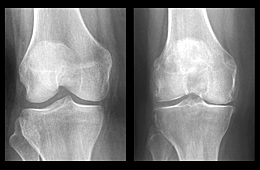

As you get older, you may notice your knees are less forgiving when it comes to jaunting up and down the stairs. A study supported in part by the U.S. Department of Agriculture's (USDA) Agricultural Research Service (ARS) suggests that if you're not getting adequate vitamin D in your diet, you may be at increased risk of developing the painful condition known as "osteoarthritis" in your knees.
Osteoarthritis occurs when the natural cushioning between joints in the body wears away-allowing bones to rub together. With an estimated 27 million people succumbing to osteoarthritis, there is significant interest in finding ways to prevent or treat the condition.
The team of researchers, led by epidemiologist Fang Fang Zhang and including nutritionist Sarah Booth, investigated the possible interaction between circulating blood levels of vitamin D and the progression of knee osteoarthritis in adults. Booth is the associate director at the Jean Mayer USDA Human Nutrition Research Center on Aging (HNRCA) at Tufts University in Boston, Massachusetts, and Zhang is assistant professor of epidemiology at the Friedman School of Nutrition Science and Policy at Tufts University.
The scientists looked at a subset of data collected during a longitudinal study called the Osteoarthritis Initiative (OAI), which is a large study of individuals with, or at risk of, knee osteoarthritis. The researchers focused on 418 volunteers for whom blood serum concentrations of vitamin D were available and for whom radiographs to assess knee osteoarthritis progression were available. The volunteers were followed for 4 years and monitored for knee osteoarthritis progression and vitamin D levels in their blood.
Compared to volunteers with healthy levels, participants with low vitamin D levels had more than doubled the risk of their knee osteoarthritis worsening during the study. The scientists concluded that vitamin D deficiency is a risk factor for increased knee osteoarthritis progression and that increased, adequate dietary intake may be beneficial for those with knee osteoarthritis.
ARS is USDA's principal intramural scientific research agency. Read more about this research in the July 2015 issue of AgResearch magazine.
7.21.2015